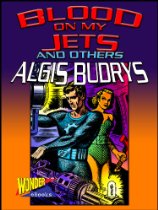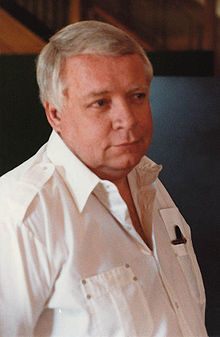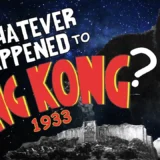 Blood on my Jets
Blood on my Jets
Algis Budrys
Wonder eBooks
$3.99 Kindle Nook
One of the advantages of the ebook revolution is that the work of previous generations of science fiction writers can be brought back into print for new generations of readers.
Wonder eBooks has a list of titles whose authors range from masters of the field to names only historians of the field or those who’ve been around a really long time will recognize.
I’ve heard a number of writers I respect talk about what a great writer Budrys was. I had the privilege to meet the man on several occasions prior to his death, primarily at Conestoga. He only had a few volumes of short fiction published in his lifetime. The ones I’ve managed to obtain have overall been quite good.
So I snatched up this collection when I saw it.
I’ve always enjoyed science fiction from the 1950s. Unfortunately not all the stories have aged well.
“Blood on my Jets” (1953) is probably the story that holds up the best, and fortunately it’s one of the two longest in the book, which is only 102 pages long in epub format. Ash is an undercover operative for the government who finds himself involved in a complex plot to stop a space pirate who’s out to steal the first interstellar drive. The woman who ropes him into the plot is someone he knew years ago, and he’s never sure what her motives really are.
This one had a nice noir feel to it, especially in the early portions. It’s probably not the sort of thing that could be published today in its current form, if for no other reason than the science involved is too outdated. (There are indigenous natives on Mars.) Still it was a fun piece and the one I enjoyed the most.
“Die, Shadow” (1963) uses the familiar trope of a man awakening after centuries in suspended animation. He finds he must fight against people from a shadow dimension.
“The Burning World” (1957) was the other long story in the book. It’s one of those political stories that consists mostly of talk. As is typical of this type of tale from this period, the politics are somewhat contrived and vague. The president of whatever the regional political entity is (it’s never clearly defined) is trying to set up his successor with his daughter. Only his daughter brings the young political rival home to dinner the night her father had arranged for his successor to spend some time with her. Angry with the views of the young rival, he calls an election in the hopes his successor will win by a landslide and show his daughter that he knows best.
And that’s the crux of the problem. The man is one of the group that overthrew a dictatorship. He sincerely believes he knows best, and that his government is the best thing for the people. If only his daughter and the other young people would recognize this…
My first memories of politics are the Watergate hearings. I have a difficult time believing the government knows what’s best for me. The longer this story went on, the more I disliked all the characters. Probably because they weren’t characters so much as archetypes. There’s a lot of political talk that amounts to “If only these people would understand that we’re doing this for their own good…”. In the end, the president and his would-be successor have to tamper with the election to win.
According to the ISFDB, this story has been reprinted in two of Budry’s collections. Still, I don’t consider it his best.

The final selection is “Firegod” (1953), in which a man uses relativity to set himself up as a god on a primitive world. The ending was predictable and the message a little heavy handed for my liking. Probably why it was published in Rocket Stories. (No, I hadn’t heard of the magazine either before I looked up the story’s publication history.)
I wasn’t overly impressed with the format of the ebook. There was no interactive table of contents. Also, there were a number of typos. This one is probably for the Budrys enthusiast.
Budrys was quite prolific starting from 1952 through the early 60s. There are better stories out there than these. Budrys never had a Best of collection published. I wish someone (Paging Mr. Haffner…) would publish a comprehensive collection of his work because some of the ones I’ve read have been quite good. Certainly better than most of these.










Recent Comments